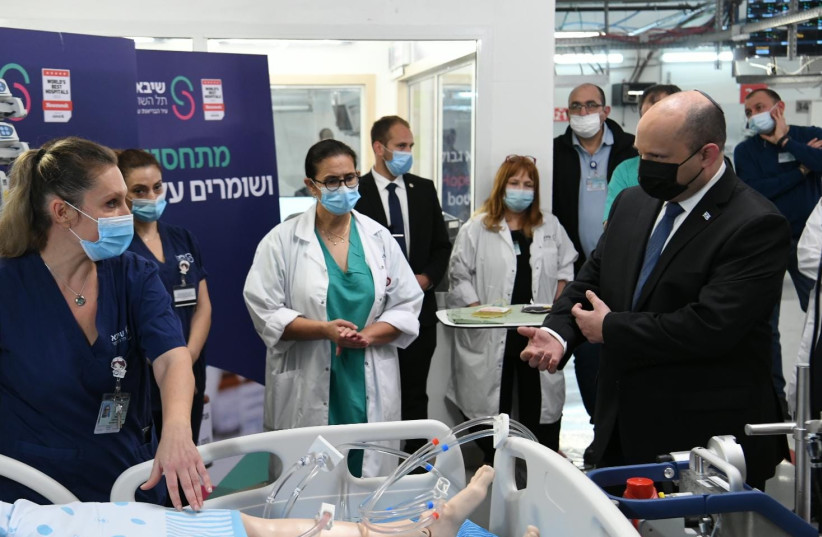As Omicron sweeps through Israel, vaccination still effective, expert says

With Omicron cases surging, Ben Gurion University immunologist Tomer Hertz says getting vaccinated or getting a booster is crucial.
Over the past few weeks, as the Omicron wave began to sweep through the country and cases surged to an unprecedented level, it quickly became clear that what some health officials and experts had feared was true: the corona vaccines have been significantly less effective in protecting individuals from getting infected compared with what happened with other strains of the virus.
At the same time, it has also been proven that full inoculation has remained an excellent shield against serious disease, and for this reason it is important that the public continues to be aware of it, said Ben-Gurion University immunologist Prof. Tomer Hertz.
“It is pretty clear that Omicron is very different from all the other variants we had previously seen,” said Hertz.
“Unlike other variants, it does a very good job in escaping neutralizing antibodies in both vaccinated and recovered individuals. This means that while it still has a better chance to infect unvaccinated people, it can easily infect also inoculated ones, because it is highly contagious. The question is: is there still a benefit in getting vaccinated? The answer is definitely yes, because we have a great amount of data, not only from previous variants but also about Omicron, that if one is [vaccinated], their chances to develop a severe disease are significantly lower.”
In a report published on Wednesday, Hebrew University experts assessed that the vaccine efficacy in preventing infection might have dropped to as low as 10%-20%, but when it comes to serious symptoms, it is still higher than 90%.
As of Wednesday morning, Israel had 254 serious patients, with 102 of them not vaccinated, 25 were vaccinated more than six months ago, and 112 were fully vaccinated.
However, the absolute numbers could be deceptive, Hertz said, considering that among the eligible population, the majority are inoculated, especially those over 60, who are more likely to develop serious symptoms.
The normalized figures – that is, the numbers of patients in serious condition for every 100,000 people – offer a completely different picture.
Of those over 60, there were 61.2 patients in serious condition among the unvaccinated, 21.3 among those jabbed more than six months earlier, and 7.9 among those fully vaccinated. Of those individuals younger than 60, there were 1.7 unvaccinated patients, 0.8 vaccinated patients, and 0.1 fully vaccinated.
“We also have to consider that there are people who get vaccinated and for different reasons do not develop an immune response,” Hertz said. “At the end of the day, some vaccinated individuals might still get very sick, because the protection is not perfect, but it is a lot less likely.”
Asked whether there is a correlation between the time elapsed since receiving the third vaccine shot and the risk of getting infected with Omicron, Hertz said it is too soon to answer, as there is not enough available data.
However, he noted that a lot of data does support the need for a third shot, and shows a very significant gap in efficacy between those receiving just two vaccines and those getting the third.
“The third booster increases both the number of antibodies and the quality of the immune response, and therefore improves the protection offered by the vaccine,” he said. “It is unclear whether the fourth booster will actually have the same effect. There are some who think it may help and others who think it may not help at all.”
Israel began offering the fourth shot to all people over 60 at the beginning of last week, with 458,282 having received it as of Wednesday. The high number of breakthrough infections and the reduction of the antibody level in the blood were among the reasons behind the decision.
In light of the infectiousness of the variant, Hertz said that getting vaccinated or getting a booster, for those who have not yet done so, is crucial, but he also recommended taking other precautions.
“Omicron is here and the hospitals are going to be flooded,” he said. “Our social behavior does make a difference, so right now I would suggest avoiding unnecessary risks. Right now there is no need to go to a crowded bar.”
Jerusalem Post Store
`; document.getElementById("linkPremium").innerHTML = cont; var divWithLink = document.getElementById("premium-link"); if (divWithLink !== null && divWithLink !== 'undefined') { divWithLink.style.border = "solid 1px #cb0f3e"; divWithLink.style.textAlign = "center"; divWithLink.style.marginBottom = "15px"; divWithLink.style.marginTop = "15px"; divWithLink.style.width = "100%"; divWithLink.style.backgroundColor = "#122952"; divWithLink.style.color = "#ffffff"; divWithLink.style.lineHeight = "1.5"; } } (function (v, i) { });

